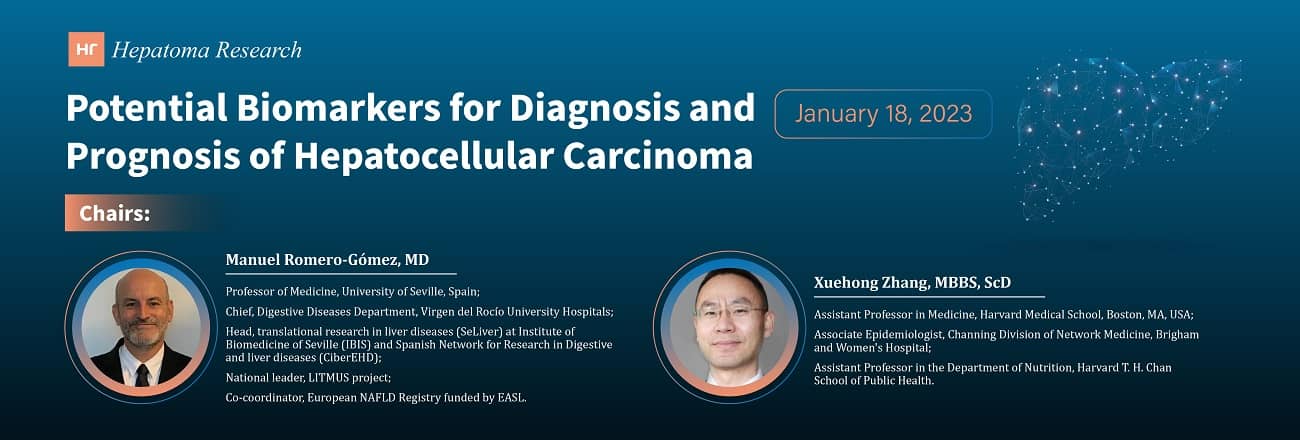Contents
Chair(s)

Manuel Romero-Gómez, MD
Professor of Medicine, University of Seville, Spain;
Chief, Digestive Diseases Department, Virgen del Rocío University Hospitals;
Head, translational research in liver diseases (SeLiver) at Institute of Biomedicine of Seville (IBIS) and Spanish Network for Research in Digestive and liver diseases (CiberEHD);
National leader, LITMUS project;
Co-coordinator, European NAFLD Registry funded by EASL.
Chief, Digestive Diseases Department, Virgen del Rocío University Hospitals;
Head, translational research in liver diseases (SeLiver) at Institute of Biomedicine of Seville (IBIS) and Spanish Network for Research in Digestive and liver diseases (CiberEHD);
National leader, LITMUS project;
Co-coordinator, European NAFLD Registry funded by EASL.

Xuehong Zhang, MBBS, ScD
Assistant Professor in Medicine, Harvard Medical School, Boston, MA, USA;
Associate Epidemiologist, Brigham and Women's Hospital;
Assistant Professor in the Department of Nutrition, Harvard T. H. Chan School of Public Health;
Co-Chair, Liver Cancer Task Force, Dana Farber Harvard Cancer Center.
Associate Epidemiologist, Brigham and Women's Hospital;
Assistant Professor in the Department of Nutrition, Harvard T. H. Chan School of Public Health;
Co-Chair, Liver Cancer Task Force, Dana Farber Harvard Cancer Center.
Speaker(s)

Towia Libermann, PhD
Associate Professor of Medicine, Division of Interdisciplinary Medicine and Biotechnology, Beth Israel Deaconess Medical Center, Boston, USA;
Director, BIDMC Genomics, Proteomics, Bioinformatics, and Systems Biology Center and DF/HCC Cancer Proteomics Core.
Topic: Pre-diagnostic Plasma Proteomics to Identify Biomarkers for Earlier Detection of Liver Cancer
Director, BIDMC Genomics, Proteomics, Bioinformatics, and Systems Biology Center and DF/HCC Cancer Proteomics Core.
Topic: Pre-diagnostic Plasma Proteomics to Identify Biomarkers for Earlier Detection of Liver Cancer

Lichun Ma, Ph.D
NIH Stadtman Investigator, Cancer Data Science Laboratory;
Co-affiliation, Liver Cancer Program, National Cancer Institute, National Institutes of Health, Bethesda, MD, USA.
Topic: Biomarkers of Liver Cancer: a Single-cell View
Co-affiliation, Liver Cancer Program, National Cancer Institute, National Institutes of Health, Bethesda, MD, USA.
Topic: Biomarkers of Liver Cancer: a Single-cell View
Maria Jose Serrano Fernández, PhD
Principal Investigator, Liquid Biopsies & Cancer Interception (LiqBiopCI), Oncology Department, Hospital Virgen de las Nieves, GENyO Centre, Granada, Spain;
Associate professor, University of Granada, Spain;Vice president of the International Society of Liquid Biopsy (ISLB);
Innovative Public Purchase coordinator, Health of Andalucia, Spain.
Topic: The Future of Personalized Medicine in Liver Cancer
Associate professor, University of Granada, Spain;Vice president of the International Society of Liquid Biopsy (ISLB);
Innovative Public Purchase coordinator, Health of Andalucia, Spain.
Topic: The Future of Personalized Medicine in Liver Cancer

Beatriz Mínguez, MD, PhD.
Liver Unit, Hospital Universitari Vall d'Hebron, Liver Cancer Research Lab, Liver Diseases, Vall d´Hebron Institute of Research (VHIR);
Assistant professor, Department of Internal Medicine, Universitat Autònoma de Barcelona, CIBERehd, Vall d’Hebron, Barcelona Hospital Campus, Barcelona, Spain
Topic: Liquid Biopsy for HCC: What's in the Pipeline?
Assistant professor, Department of Internal Medicine, Universitat Autònoma de Barcelona, CIBERehd, Vall d’Hebron, Barcelona Hospital Campus, Barcelona, Spain
Topic: Liquid Biopsy for HCC: What's in the Pipeline?

Manuel L. Rodríguez-Perálvarez
Consultant Hepatologist and Associate Professor of Medicine, Department of Hepatology and Liver Transplantation, Hospital Universitario Reina Sofía and Univeristy of Córdoba, Spain.
Topic: Clinical Applications of HCC Biomarkers: from Bench to Clinic
Topic: Clinical Applications of HCC Biomarkers: from Bench to Clinic

Jan Best
Senior Consultant Gastroenterology, Department of Internal Medicine, University Hospital Knappschaftskrankenhaus Bochum, Ruhr University Bochum, Bochum, Germany.
Topic: Role of GALAD Score for HCC Early Detection in NASH Patients
Topic: Role of GALAD Score for HCC Early Detection in NASH Patients
Introduction
Hepatocellular carcinoma is a devastating disease that require the implementation of personalized medicine to improve management and care of patients with HCC. Developing biomarkers able to reach early diagnosis is crucial to improve survival. Besides, biomarkers helping predicting prognosis and to allow us to better monitoring HCC therapy could improve quality of life and survival. Liquid biopsy emerged as a powerful tool including genetics, epigenetics, transcriptomic, metabolomic, proteomic and exposome. The interaction between different intermediate metabolites is the major challenge we must address in the future. Improving technology, methodology and systems we could reach cheaper, faster, and more efficacious manner to reach our goals. Imaging biomarkers are a crucial pillar. MRI together with CT and ultrasonography in integrated systems could detect liver cancer in early stages. Moreover, dynamic studies could allow us to better understand the nature of the tumor and the potential progression. Bringing liquid biopsy and imaging biomarkers, radiomic, could impact in the clinical daily decision making. Physicians should improve knowledge and skills managing the interpretation of liquid biopsy and imaging biomarkers both for diagnostic aims but also to improve management and monitoring of this disease. Biomarkers could change our manner to apply therapy in patients with HCC. Biomarkers could be useful in the decision-making but also as potential target. Personalized medicine approach to liver cancer require feeling comfortable looking it at as a personalized approach when patient's characteristic are the driver in the decision making.
Programme
Programme
- Time (Spain, GMT+1)
- Speakers
- Topics
- 17:00 - 17:02
- Chairs (Manuel Romero-Gómez)
- Welcome Remarks
- 17:02 - 17:17
- Lichun Ma
- Biomarkers of Liver Cancer: a Single-cell View
- 17:17 - 17:32
- Beatriz Mínguez
- Liquid Biopsy for HCC: What's in the Pipeline?
- 17:32 - 17:47
- Towia Libermann
- Pre-diagnostic Plasma Proteomics to Identify Biomarkers for Earlier Detection of Liver Cancer
- 17:47 - 18:02
- Manuel L. Rodríguez-Perálvarez
- Clinical Applications of HCC Biomarkers: from Bench to Clinic
- 18:02 - 18:17
- Jan Best
- Role of GALAD Score for HCC Early Detection in NASH Patients
- 18:17 - 18:32
- Maria Jose Serrano Fernández
- The Future of Personalized Medicine in Liver Cancer
- 18:32 - 18:52
- /
- Free Discussion (Q&A)
- 18:52 - 18:55
- Chairs (Xuehong Zhang)
- Concluding Remarks
Moments








Presentation
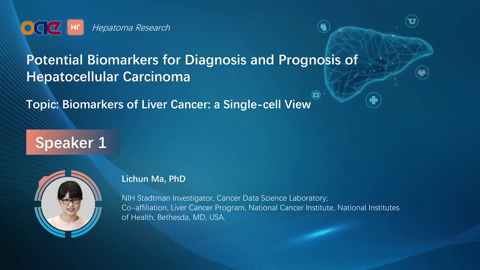
Lichun Ma, National Institutes of Health
Topic:Biomarkers of Liver Cancer: a Single-cell View
NaN
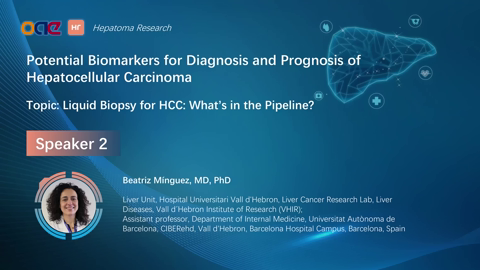
Beatriz Mínguez, Vall d´Hebron Institute of Research (VHIR)
Topic: Liquid Biopsy for HCC: What's in the Pipeline?
NaN
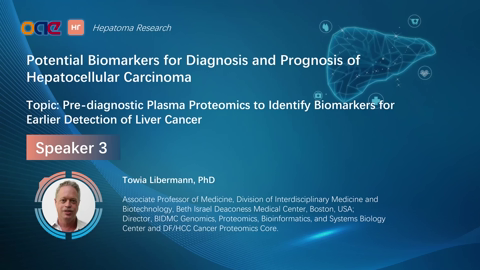
Towia Libermann, Beth Israel Deaconess Medical Center
Topic: Pre-diagnostic Plasma Proteomics to Identify Biomarkers for Earlier Detection of Liver Cancer
NaN
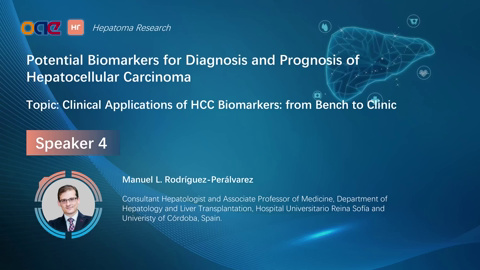
Manuel L. Rodríguez-Perálvarez, Hospital Universitario Reina Sofía and Univeristy of Córdoba
Topic: Clinical Applications of HCC Biomarkers: from Bench to Clinic
NaN
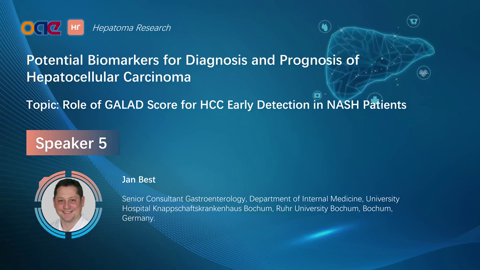
Jan Best, Ruhr University Bochum
Topic: Role of GALAD Score for HCC Early Detection in NASH Patients
NaN
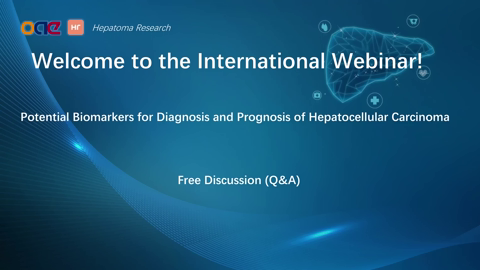
Discussion Part
NaN




